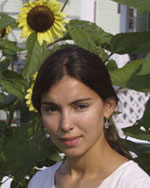Opportunities flourish in Bates senior’s gardens
Pole beans, cukes, and tomatoes are among the things that Bates senior Rachel Booty and a group of local teenagers grow in downtown Lewiston.
They grow youthful aspirations, leadership skills and neighborhood spirit too.
Scion of a farming family in Sandwich, N.H., Booty has put her agricultural experience to work for Lots to Gardens, a Lewiston-based nonprofit founded in 1998 by another Bates student, Kirsten Walter. Booty — who is as passionate about civic involvement as she is about raising food — is the youth coordinator for the program, which uses gardening projects to strengthen community and support local young people.
Few of us can pass a rose without sampling its perfume or a vegetable bed without eyeing the tomatoes, and this primal appeal drives Lots to Gardens. Urban beautification is part of the mission — in fact, Booty’s young gardeners maintain several public flower beds around the twin cities.
But the program’s crux is the use of vegetable gardens to build both neighborhood solidarity and, for the youths who sign on to tend the gardens for a stipend, personal and work skills conducive to leading a better life.
“It feels great,” says one crew member, 19-year-old Christina Breth. “We know we accomplished something ourselves. And we’re giving back to the community.”
Lots to Gardens maintains organic vegetable beds in two downtown Lewiston neighborhoods. The one on Blake Street is new while the other, on Knox Street, is in its fourth year. Although one evening a week residents work together in the gardens in exchange for produce, the Lots to Gardens youth crew — numbering eight this year — directs and performs most of the gardening, from designing the beds to site prep, from planting to harvest. Field trips to local farms are also part of the program.
“We base our summer program on youth leadership and youth development. All of the rules and standards for the workplace are developed by the crew,” Booty says. “They really take a lot of leadership.”
The idea is to strengthen self-esteem, responsibility and an appreciation for teamwork, in addition to providing practical experience and a summer income. Lots to Gardens looks for participants at the Lewiston and Auburn high schools, in local transitional-living programs and among people fulfilling community service commitments.
It’s a popular gig. “It’s a workplace that’s so significantly different than any other place that you might find for a summer job,” Booty says, “that we probably got 35 applicants this year.”
Booty, one of four paid Lots to Gardens staffers, has worked full time this summer and will continue part time during the academic year. Lots to Gardens is affiliated with the Sisters of Charity Foundation, in Lewiston, and receives additional grant support from agricultural and youth programs. It’s modeled on such operations as Boston’s Food Project, which was launched in 1991 and now distributes some 250,000 pounds of food to farmers’ markets, homeless shelters and program participants.
Operating on a much smaller scale, Lots to Gardens’ produce all goes to those who grow it: neighborhood residents and the youth crew. Through a survey each spring, residents express their preferences for the summer’s crops. This summer’s offerings include zucchini, sweet corn, garlic, eggplant, cabbage and broccoli.
“We have a pole-bean teepee this year that’s looking gorgeous,” Booty says. “Of course, that’s the kids’ favorite place to play.”
Naturally, tomatoes and cucumbers are particular favorites. “We ended up having a significant amount of volunteer tomatoes this year,” Booty notes with a smile. “You wonder who threw those.” Next year, she hopes to start a garden on Pierce Street for plants appropriate to the cities’ diverse immigrant cuisines.
The gardens provide a social focus, a rallying point. On run-down Knox Street, it’s been a challenge winning respect for such a vulnerable space — yet, Booty says, “as more people have gotten involved in it, of course they’ve taken ownership of it.”
Another goal of Lots to Gardens is simply to re-establish the connection between the land and what we eat, while sharing some ideas about the value of local sustainable food supplies. Preparing fresh fruits and vegetables for the table is part of the program for the crew members, who get cooking lessons and, three days a week, a lunch made from their own vegetables and other food produced in the area.
They’ve baked bread and made ice cream from locally produced ingredients. “We spent a whole afternoon picking zucchini and squash,” says Booty, “and baked ourselves a huge vegetable lasagna for dinner — from garden to table in hours.”
Crew member Sonya Strout, 15, is a convert to chem-free homegrown food. “We know where it’s from,” she says, adding with a smile, “We know it won’t kill us.”
Garden-to-table comes naturally to Booty, who grew up knowing that pretty much all her food came from right outside the house. Run by Peter and Diane Booty with help from Rachel’s younger sisters, Hannah and Robin, Booty Farm sells its organic produce to restaurants and grocery stores in central New Hampshire, as well as directly through the traditional roadside stand.
Booty, an environmental studies major at Bates with a concentration in environmental geology, started working in community gardens in Lewiston during her sophomore year. For her, Lots to Gardens is a way to advance her academic career while indulging her passions for feeding people and making a difference in her community. She entertains the notion of becoming a baker after Bates — but whatever she does, she says, “working one-on-one with people, especially with youth, is something that I always want to be doing.”




